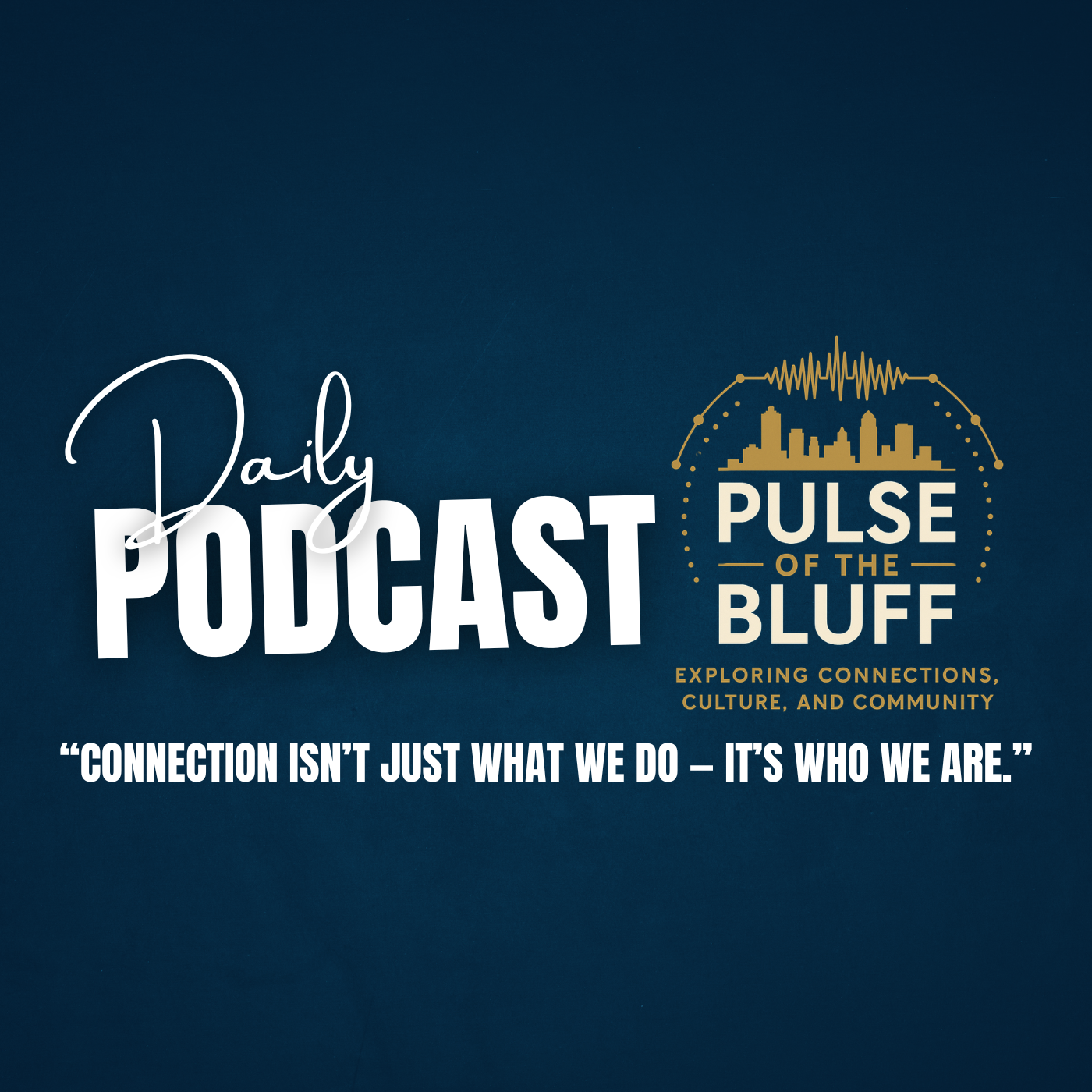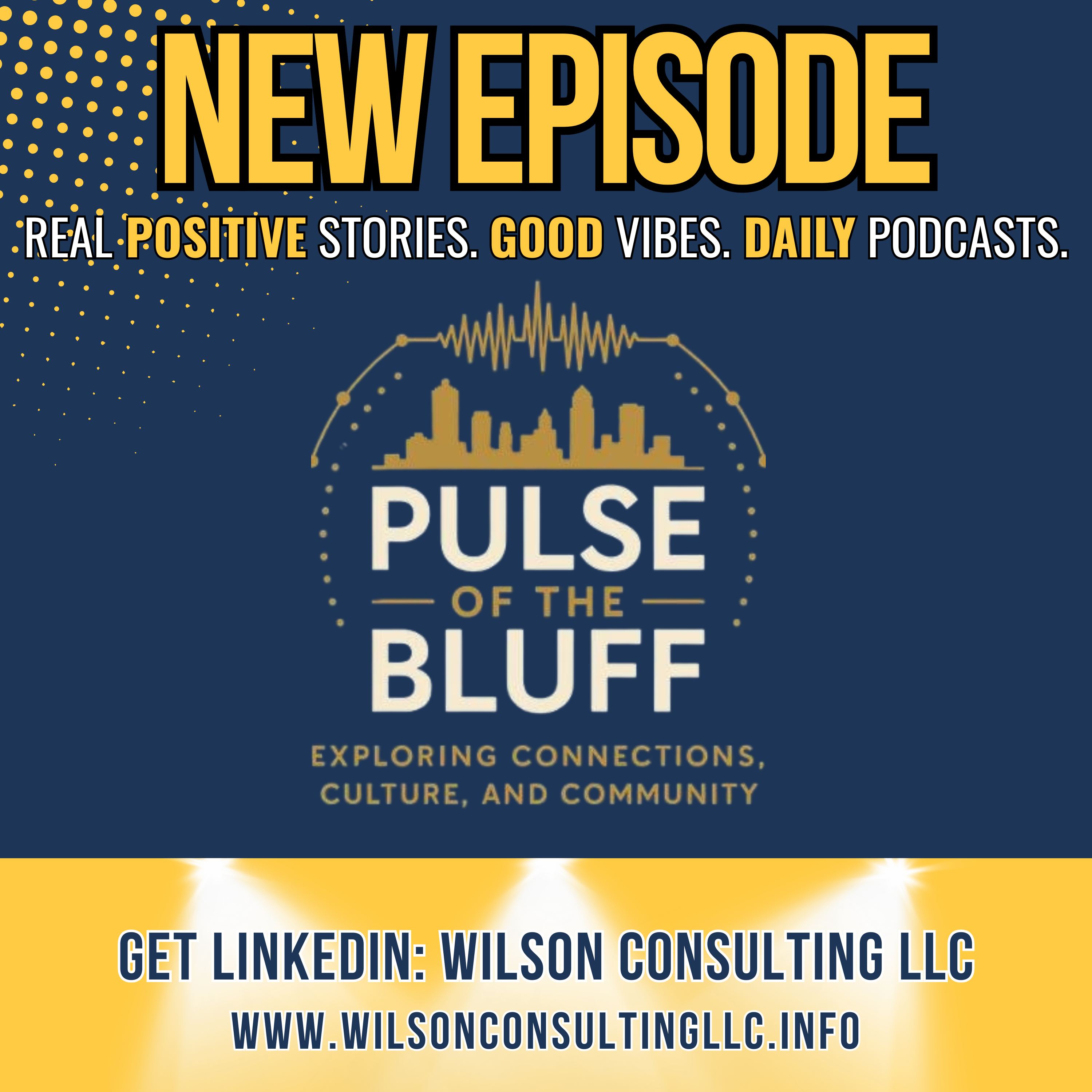Episode Transcript
[00:00:00] Speaker A: Memphis always has a story worth sharing. And that's where Pulse of the Bluff comes in. Tune in daily for real conversations, good vibes, and the heartbeat of the bluff city.
We bring you the people, places, and moments that make Memphis special. So whether you're a local or just love it, spirit hit, subscribe and join us, Pulse of the Bluff, because there's always something good to talk about.
See you in the next episode.
Listen to Pulse on the Bluff on your favorite podcast platform and subscribe to our YouTube channel, Mother's Day.
[00:00:33] Speaker B: Just saying the words brings up so much, doesn't it?
[00:00:36] Speaker C: It really does. That sort of feeling of warmth, safety.
[00:00:39] Speaker B: Yeah. Maybe a memory of some sacrifice, you know, and just that. That unconditional love.
[00:00:44] Speaker C: Exactly.
And with May 11, 2025 coming up fast for this year's Mother's Day, we.
[00:00:51] Speaker B: Thought perfect timing for one of our deep dives. We're going to explore the story behind.
[00:00:55] Speaker C: It for you, look at where it actually came from, how it changed over time into what we celebrate now.
[00:01:00] Speaker B: So if you've ever been a bit cur, say, the real roots of Mother's Day, you're definitely in the right spot. We'll get you the key info. Quick but thorough.
[00:01:09] Speaker C: Definitely.
[00:01:10] Speaker B: And speaking of special, a really happy Mother's Day to all the amazing mothers out there, especially those tuning in from Memphis and the surrounding areas.
[00:01:17] Speaker C: Yes, happy Mother's Day. It's interesting, you know, Mother's Day feels quite modern in some ways, but this, this drive to honor mothers that goes way, way back.
[00:01:27] Speaker B: Right?
[00:01:27] Speaker C: When you start digging into history, you find these threads, this. This deep respect for motherhood popping up in all sorts across huge spans of time.
[00:01:37] Speaker B: Okay, so let's pull on those ancient threads then. The sources mention ancient Greece and Rome. What were they actually doing back then? Was it like a specific day or.
[00:01:46] Speaker C: It was definitely more involved than just marking a calendar date. In ancient Greece, they had these pretty significant festivals all dedicated to Rhea, the.
[00:01:55] Speaker B: Mother of the gods.
[00:01:55] Speaker C: That's the one. Think of it like a major cultural event, really recognizing her importance, her power. And the Romans did something similar, celebrating Sabael, another really powerful mother Godd figure.
[00:02:07] Speaker B: So not exactly our Mother's Day, but the same core idea.
[00:02:10] Speaker C: Precisely. They clearly show this. This long standing societal view of mothers having this fundamental, almost mythic status. It makes you think, why, you know, why did they put such emphasis there?
[00:02:23] Speaker B: That's a great point. Not just that they celebrated, but why? Okay, so we've got these big ancient events. What about closer to our own time? You mentioned Mothering Sunday in the UK earlier, how does that fit in?
[00:02:35] Speaker C: Right, Mothering Sunday, that came out of the early Christian tradition. Originally, it was the fourth Sunday in Lent, and the focus was really on honoring the mother church, the main church.
[00:02:45] Speaker B: Or cathedral in the area. Like a spiritual mother.
[00:02:48] Speaker C: Exactly, a spiritual mother figure. But then over time, especially in the uk, that focus started to broaden. It began to include honoring your actual mother as well.
And it gradually shifted towards being more of a wide. Well, a secular family celebration. So even before the US Officially had Mother's Day, this tradition was developing, setting aside time to appreciate mothers.
[00:03:10] Speaker B: It does make you wonder, doesn't it, about that, that basic human need for a day like this?
[00:03:15] Speaker C: It really does.
[00:03:16] Speaker B: Okay, so we've got ancient roots, this UK evolution. Let's. Let's jump across the Atlantic now. 19th century America. What was going on there? What made the US fertile ground for this idea? Sounds like it was tied into some big national stuff.
[00:03:29] Speaker C: Oh, absolutely. The 19th century in the U.S. i mean, it was a time of huge, huge upheaval. After the Civil War especially, there was this really strong desire for reconciliation, for unity.
[00:03:42] Speaker B: Makes sense.
[00:03:43] Speaker C: And within that context, people were starting to recognize more openly the vital role women and mothers specifically played in holding society together. And that's really where Ann Reeves Jarvis comes into the picture.
[00:03:54] Speaker B: Ann Reeves Jarvis.
[00:03:55] Speaker C: Yeah.
[00:03:56] Speaker B: Right. Her name is key here.
[00:03:57] Speaker C: Yeah.
[00:03:58] Speaker B: So what did she do? What was the groundwork? She laid these Mother's Day work clubs. What were they about?
[00:04:04] Speaker C: So Anne raised Jarvis. She was in West Virginia, and she started these Mother's Day work clubs well before the holiday existed as we know it.
And their first schools were really practical, teaching women about childcare, hygiene, health, things to improve family life.
[00:04:20] Speaker B: Right.
[00:04:21] Speaker C: But what's really fascinating, especially after the Civil War, is how these clubs became places for community building, for bridging the divides between women from different sides of the conflict.
[00:04:31] Speaker B: So it wasn't just about boiling water safely, it was about healing.
[00:04:34] Speaker C: Exactly. It was about healing a broken society, really, from the ground up.
[00:04:38] Speaker B: Wow. That adds a whole different dimension.
The source mentions a Mother's friendship day in 1868. Tell us about that. Sounds incredibly important for that time.
[00:04:47] Speaker C: It was hugely significant, this Mother's Friendship Day she organized. It brought together mothers whose sons had fought on both sides, Union and Confederates.
[00:04:57] Speaker B: Together in the same place.
[00:04:58] Speaker C: Yes. The whole point was reconciliation, to create a space to heal, to move past the bitterness of the war. It was this powerful symbol of, you know, the common ground of motherhood, that.
[00:05:09] Speaker B: Shared experience, shared loss, maybe.
[00:05:11] Speaker C: Precisely. Despite Everything else, they shared that. It really shows how local actions can. Can ripple outwards, you know, that's incredibly.
[00:05:19] Speaker B: Moving to think about. So Anne Rhys Jarvis is doing this vital community work. Then we hear about Julia Ward Howe. Her call for a Mother's Day for Peace in 1870.
What was her angle? Was it different?
[00:05:32] Speaker C: Yeah, Julie Ward Howe, famous writer, activist. She came at it from a slightly different perspective, though. Definitely related. She was deeply, deeply affected by the war's suffering. And she put out this really passionate call, this proclamation for a Mother's Day for peace. Her idea was for women everywhere to unite against war, to actively push for.
[00:05:53] Speaker B: Peace, using their role as mothers as.
[00:05:55] Speaker C: A platform, Kind of. Yeah. She felt motherhood gave women a unique moral authority to speak out against conflict. Now, her specific push to make it an official holiday didn't quite succeed then.
[00:06:07] Speaker B: Right.
[00:06:08] Speaker C: But she absolutely added her voice to this growing conversation about recognizing mothers and their potential impact on the world. It makes you think about how different people contribute to a movement in different ways.
[00:06:20] Speaker B: Okay, so we have these different strands in the 19th century.
Community building, peace activism, all centered on mothers. How do we get from there to the actual holiday we have now? That seems to really come down to Anna Jarvis. Right. Anne's daughter.
[00:06:32] Speaker C: Exactly right. The modern Mother's Day, the national holiday that's largely thanks to, well, the relentless work of Anna Jarvis.
[00:06:39] Speaker B: She was inspired by her mom, deeply.
[00:06:42] Speaker C: Inspired by her mother's life and work. And then when her mother died in 1905, Anna basically made it her life's mission to get a day established to honor her memory and, by extension, all mothers. Her personal grief really fueled a national campaign.
[00:06:56] Speaker B: And she didn't just, like, wish for it. The sources say she was actively campaigning. How did she do it? How did she make it happen?
[00:07:03] Speaker C: Oh, she was incredibly focused, very strategic. In 1908, she organized what most people see as the first official Mother's Day celebration. That was in Grafton, West Virginia.
[00:07:13] Speaker B: At her mother's church.
[00:07:14] Speaker C: Yes, exactly. But she knew local wasn't enough, so she launched this massive letter writing campaign.
[00:07:19] Speaker B: Wow.
[00:07:20] Speaker C: Thousands of letters to politicians, governors, influential businessmen. You mentioned John Wanamaker earlier. Church groups, women's organizations, just tirelessly pushing for national recognition. It really shows what one determined person can do.
[00:07:34] Speaker B: And it worked. 1914, President Woodrow Wilson makes it official. Second Sunday in May. National holiday. That must have felt amazing for Anna.
[00:07:42] Speaker C: You'd think so, right? A huge victory. But this is where the story takes a bit of a sad, ironic twist. Oh. While Anna Jarvis was the one who made Mother's Day happen. She later became one of its biggest critics. Specifically, she hated how commercial it became.
[00:07:58] Speaker B: Commercialization. What bothered her? Too many cards and flowers?
[00:08:01] Speaker C: Pretty much, yeah. Her vision was deeply personal. A day for, you know, sincere, heartfelt expressions of love. Writing a personal letter, spending time together, real appreciation.
[00:08:11] Speaker B: Not just buying stuff.
[00:08:12] Speaker C: Exactly.
And as it quickly became about buying expensive gifts from fancy flowers, candy, restaurants, she felt the original meaning, that intimate connection was being lost. She thought it was all about profit, not sentiment.
[00:08:27] Speaker B: Wow.
Yeah, ironic is the word.
[00:08:30] Speaker C: It's a fascinating look at, you know, unintended consequences, even when you start with the best intentions.
[00:08:35] Speaker B: So she fought for it and then fought against how it was celebrated. But despite her feelings, I mean, Mother's Day today is huge, isn't it?
[00:08:43] Speaker C: Culturally, economically, absolutely massive.
[00:08:45] Speaker B: Yeah.
[00:08:46] Speaker C: Despite Anna's later feelings, it's become this incredibly popular, widely celebrated day in so many countries. Yeah. And what's interesting too is that while lots of places like the us, Canada, Australia do it on the second Sunday of May, many others have their own.
[00:08:59] Speaker B: Dates and traditions, like Mothering Sunday in the uk, which is earlier.
[00:09:03] Speaker C: Exactly. And then you've got, say, Thailand celebrating in August on the Queen's birthday. Costa Rica, also in August. Georgia celebrates in March. Each one reflects something unique about their own culture and history.
[00:09:16] Speaker B: So, wow.
From ancient goddesses to peace movements, to this one woman's determination, and then her disappointment.
The story is way more complex than just buying a cart.
[00:09:27] Speaker C: Much more complex.
[00:09:28] Speaker B: It definitely holds a really special place for so many people. And especially thinking today about all the mothers right here in Memphis in the mid South.
[00:09:35] Speaker C: Absolutely. It connects us back to these ancient ideas, but it's also so immediate, so personal for families and everywhere, including Memphis.
[00:09:43] Speaker B: Well, as we wrap up this deep dive, it's clear Mother's Day has been on quite a journey. Ancient rituals, 19th century activism, modern celebrations like we see right here in Memphis. But that core idea, appreciating mothers, that seems constant.
[00:09:56] Speaker C: A powerful constant indeed.
[00:09:58] Speaker B: And on that note, again, just our warmest wishes for a truly happy Mother's Day. To all the mothers in Memphis, all around the area, we hope your day is wonderful, filled with love, and maybe.
[00:10:09] Speaker C: That leaves you, the listener, with something interesting to think about.
When you celebrate Mother's Day today, with all its modern traditions, how do you personally connect that back to the simpler, more personal vision Anna Jarvis originally had? It's definitely something to ponder as we celebrate.
[00:10:25] Speaker A: This episode of Pulse of the Bluff podcast is proudly sponsored by Warren L. Houston, msl, offering attorney level wisdom and knowledge without the high attorney fees. Planning your future starts with the right team. Whether you need a will, a trust or just expert guidance, Warren L. Houston makes it simple, affordable and personal. Protect your Legacy today. Call 346-217-0595 to schedule your consultation.


